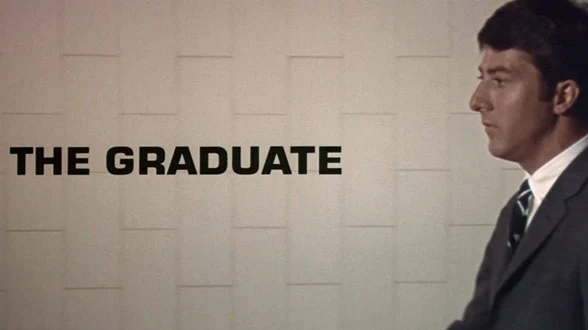

The New Hollywood Arrives.
“Hello Darkness, my old friend…” croon Simon and Garfunkel in the opening moments of Mike Nichols’ The Graduate as Dustin Hoffman makes his way through the airport, something later given a nod in the opening scene of Tarantino’s underrated Jackie Brown. While the song has become a meme of sorts, there’s no denying how perfectly it captures the state of mind of the lead character. Ben has just graduated from college and finds himself at a loss for what to do next. So, he does what any logically thinking person would do, he has an affair with an older woman and then starts sleeping with her daughter. Nichols’ film perfectly captures the zeitgeist of the disillusioned youth of 1960s America.
Ben has returned home for the summer after completing college and spends his days lazing about, refusing to make moves towards a career. One evening at a party arranged by his parents, to celebrate his return. He is celebrated and tugged and pulled between his parent’s friends who want to congratulate him on what a great man he is. It’s obvious he certainly doesn’t feel like being celebrated. Then he meets Mrs. Robinson. A name so iconic any reader, whether they’ve seen the film or not, will know who I’m referring to. Mrs. Robinson is instantly flirtatious with Ben. Something which catches him off guard. At first, he is unsure how to react but it’s clear the danger of the situation excites him. Thus begins one of cinema’s most famous affairs. Ben continues along this self-destructive path even further when, at the behest of his parents, he takes Mrs. Robinson’s daughter, Elaine, out on a date. At first Ben tries to make the date unbearable for Elaine so that there is no chance of a follow up, but they later end up hitting it off when Ben drops this act. Ben becomes estranged from both women, once the truth of what has been happening comes to light, though this situation seems to give him purpose to achieve what he wants, or so he thinks.
The film features a star-making turn from Dustin Hoffman in the lead role. Hoffman embodies the disenchanted feeling many of the young people of the time felt with such ease. The 1960s were a tumultuous period and the youth of the time were unsure and more world-weary than the generations that came before. This generation didn’t want to just follow in the footsteps of their parents. This generation had grown up during war and were even being shipped off to it. Many rebelled but this left them feeling no sense of purpose, something clearly seen in Ben. The true star of the film though, is Anne Bancroft as Mrs. Robinson. Robinson plays a flirtatious minx who has become complacent in her boring marriage. She did follow in the footsteps of her parents, instead of following her dreams of the art world. We learn this early on when she discusses her time at college with Ben. She has since become tamed by her boring life but is dying to regain some control over her life and not follow the one society has lined up for her while she still can, in a way her and Ben have this in common
The ambiguous ending of the film is an unexpected gut punch to the audience by Mike Nichols, further cementing the confusion felt by the youth of the era. After tracking down Elaine on her wedding day to confess his love for her, much to the chagrin of both sets of parents. Elaine realises she too does not want to follow the route her parents would like her to take. The two make a grand escape from the chapel and catch a bus as a getaway from the scene. Once they’ve settled on the bus, what they’ve done seems to settle in and the film finishes on a freeze frame of both of their faces with a neutral expression. Do they regret what they’ve just done? Will they end up living happily ever after?
While the ending of the film may be ambiguous, the message Nichols’ is putting across is not. The generation of youth depicted is a highly confused one, often rejecting the path their parents and society hope they follow, often resulting in self-destructive behaviour. Mike Nichols’ film has become a hallmark of the New Hollywood movement, a movement where the classical Hollywood system was rebelled against by the younger generation of the time. Gone was the conveyor belt filmmaking system of yesteryear. Another iconic film of this movement is Arthur Penn’s Bonnie & Clyde, another Cinephile Paradiso screening of this season. The film has become one of the most memorable of the era due to the way in which it shines a light on the generational gap of the time, superb performances from Hoffman and Bancroft, as well as a stunning soundtrack, courtesy of Simon & Garfunkel.

